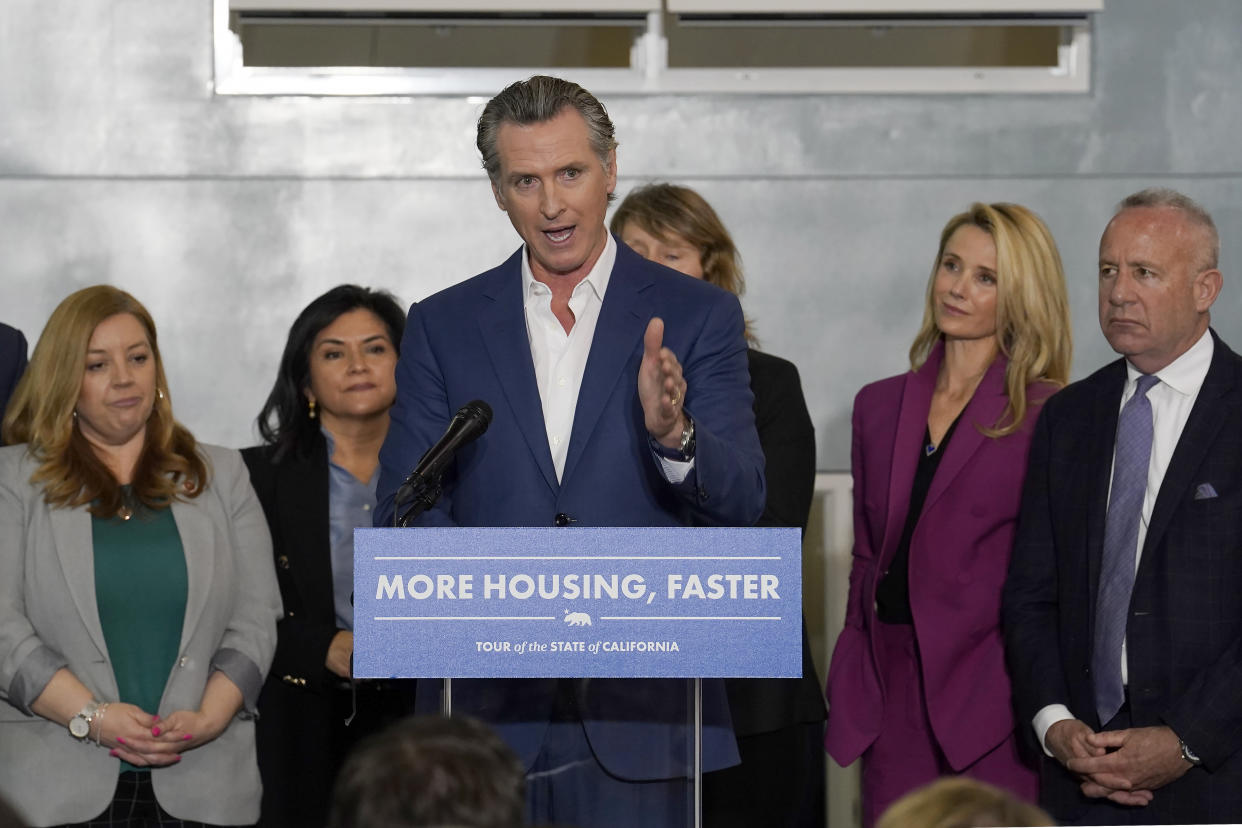Supreme Court makes it easier for cities to clear homeless encampments

- Oops!Something went wrong.Please try again later.
SAN FRANCISCO — The conservative-majority Supreme Court handed Democratic leaders like California Gov. Gavin Newsom a major win Friday by allowing them to remove tent encampments as homelessness has become a top concern of voters.
The 6-3 decision reversed a lower court ruling that severely limited how local leaders can respond as tents pitched in parks, under freeways and across sidewalks became increasingly ubiquitous symbols of the crisis.
The justices overturned the 9th Circuit Court of Appeals’ decision upholding a 2020 lower court ruling in Grants Pass v. Johnson that invalidated a southern Oregon city’s anti-camping ordinances. Justice Neil Gorsuch, writing for the majority, concluded that the power to decide how to address homelessness largely rests with local officials.
“A handful of federal judges cannot begin to ‘match’ the collective wisdom the American people possess in deciding ‘how best to handle’ a pressing social question like homelessness,” Gorsuch wrote.
Friday's ruling centered on a determination that fining or arresting people for violating local camping bans did not constitute "cruel and unusual punishment" prohibited by the Eighth Amendment. The court’s three liberal justices dissented.
The class-action Grants Pass case, filed in 2018, has vexed local officials in blue cities already struggling to reduce their homeless populations, including San Francisco, Seattle, Portland and Sacramento.
The situation has created a strange bedfellows situation for West Coast Democratic leaders as they pleaded with the high court’s conservative majority to overturn the decision from the 9th Circuit, which is usually attacked by Republicans for its liberal rulings.
Newsom praised the high court's decision, saying it "removes the legal ambiguities that have tied the hands of local officials for years."
“Today’s ruling by the U.S. Supreme Court provides state and local officials the definitive authority to implement and enforce policies to clear unsafe encampments from our streets," he said in a statement Friday.
Karen Bass, who has made addressing homelessness her top goal as Los Angeles mayor, had taken a more nuanced stance than some of her fellow Democratic leaders, expressing concerns ahead of the decision that it “could embolden those who wish to criminalize unhoused Angelenos.”
Bass slammed the decision on Friday.
“This ruling must not be used as an excuse for cities across the country to attempt to arrest their way out of this problem or hide the homelessness crisis in neighboring cities or in jail," she said in a statement.
In oral arguments before the Supreme Court in April, some of the liberal justices made similar points, aligning with advocates who say people without housing have a constitutional right to sleep outside if they have nowhere else to go.
About half of the country’s unsheltered homeless people live in California, where a mild climate makes it possible to sleep outside year-round. Washington and Oregon also have disproportionately large homeless populations, cementing the region as the epicenter of a growing national problem. The crisis intensified during the pandemic, as downtowns hollowed out and tent camps ballooned — and pressure is building for local leaders to respond more aggressively. It’s also occurring as the costs of housing on the West Coast skyrocket.
Newsom argued that confusing legal limits resulting from the lower courts’ rulings in the Grants Pass case “paralyzed” cities throughout California as they tried to remove tents. His administration filed an amicus brief with the court in March, arguing that cities “are trapped” in a no-win situation because they are at risk of being sued if they clear encampments while they are also legally responsible for maintaining safe and healthy streets.
The rulings prevented local officials from citing homeless people for camping, but have been interpreted in some cases more broadly.

